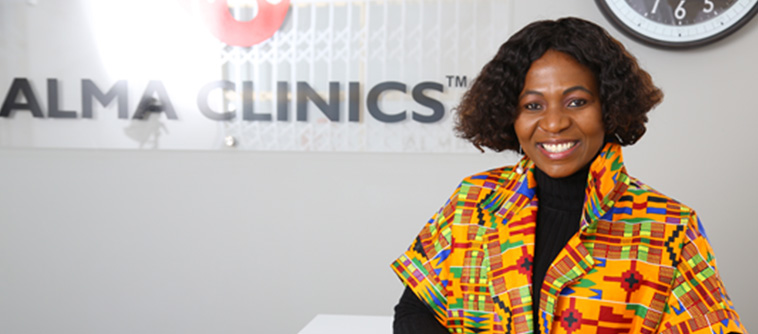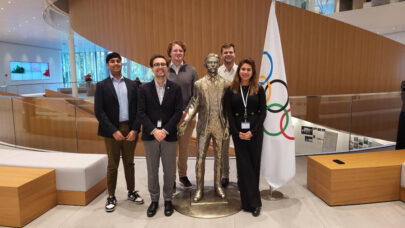
At the height of the COVID crisis in April 2020, one EMBA alumni partnership succeeded in launching two start-ups that are revolutionizing local health care in South Africa. Two distinct ventures that are intimately entwined, Alma Clinics and ABEOCARE are the brainchild of Sibongile Manganyi-Rath and Marcello Di Maulo.
Manganyi-Rath is a familiar face at IMD. The award-winning South African entrepreneur earned her Executive MBA in 2018 and gave a keynote address at IMD’s flagship Orchestrating Winning Performance event last year.
She and business partner, Marcello Di Maulo, met during their EMBA studies and were soon united in their quest to create a health care company with profound impact.
The result? A new type of nurse-led clinic (Alma Clinics) based on a savvy digital platform (ABEOCARE) that tracks and monitors all patient information. In addition to full medical history, ABEOCARE stores information on prescriptions, appointments and medical advice for each visitor. This comprehensive system is unlike any other worldwide.
“ABEOCARE is more advanced than anything you’ll find in Switzerland,” boasts Di Maulo, whose experience as an IT leader at a pharmaceutical giant piqued his interest in digital health. “In Switzerland it’s a struggle to obtain your own medical history – the information could be located anywhere from your local hospital records to your doctor’s personal laptop.”
The selling point of the platform is that, when a patient exits the clinic, they do so with complete access to all their data. The platform hub, easily available in the ABEOCARE app, contains all their relevant information and provides real-time monitoring facilitates interactions with insurance companies.
Di Maulo is responsible for ABEOCARE’s technical capabilities and runs the back-end of the platform and the associated app from his base in Switzerland, while Manganyi-Rath serves as CEO based in South Africa.
The focus on non-communicable diseases
Growing up in Soweto, Manganyi-Rath knew well the inequalities between private and public health care. With an overwhelming 90% of South Africans dependent on heavily underfunded, state-run clinics, she envisioned a solution that would bring desperately needed medical provision to the general population.
To counter the lack of knowledge and experience surrounding non-communicable diseases (most prominently cancer, diabetes, respiratory disease and cardiovascular disease) that is frequent among general practitioners, Alma Clinics empower nurses to do more in the primary health care system. The bespoke platform, ABEOCARE, is the clinical decision support upon which the clinics function. It provides best standards, health guidelines, screening for non-communicable disease risk factors and even diagnosis using blockchain technology to ensure privacy and accountability.
But the greatest benefit of ABEOCARE is that by using a digital infrastructure rather than a traditional medical infrastructure, the cost is kept to a minimum. In the end, patients reap the rewards, with both cost-savings and easier access to medical care directly in their own communities.
Importantly, it also focuses on prevention – a key factor in halting the rapid increase of non-communicable diseases like type 2 diabetes. The platform can create plans for people to improve their lifestyle choices in the hope of reversing pre-diabetes or hypertension, thereby decreasing their chances of progressing to non-communicable diseases. With more than half of annual deaths in South Africa directly attributed to non-communicable diseases, ABEOCARE and Alma Clinics support health care equity and bringing quality health care to all people outlined in the United Nations’ Sustainable Development Goal 3.
“Achieving health and wellness for all people with equal access to care is the core tenet of Alma Clinics,” says Manganyi-Rath. “The clinics take their name from The Alma-Ata Declaration of 1978, which was a milestone in public health and declared the goal of ‘Health for All’.”
Securing funding
With the majority of South African public health funding dedicated HIV and AIDS, finding the funds to fight non-communicable diseases is no easy task. And yet, Manganyi-Rath has had success on this front as well, with the clinics funded 50% by state and local governments, and 50% by private equity.
Despite the COVID crisis, the clinics and platform launched smoothly in April 2020. Thus far, Alma Clinics have served over 500 patients. The physical location is an important factor in their success – many are hosted in retail malls at the very heart of the vibrant low-income communities they serve. Manganyi-Rath and Di Maulo hope to build on this success and plan to expand to 45 clinics in the next five years.
“While this is my home, it’s not just about improving the health of South Africa,” says Manganyi-Rath.
With that in mind, Manganyi-Rath and Di Maulo also hope to expand ABEOCARE to Europe and beyond, to finally give patients in developed nations the same freedom and access to health data that the partners have provided to South Africans.



